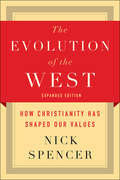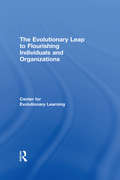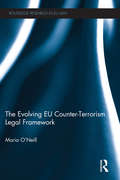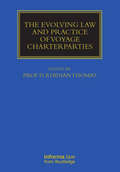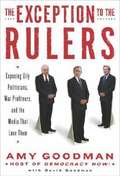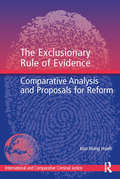- Table View
- List View
The Evolution of the West: How Christianity Has Shaped Our Values
by Nick SpencerWhat has Christianity ever done for us? A lot more than you might think, as Nick Spencer reveals in this fresh exploration of our cultural origins. <P><P>Looking at the big ideas that characterize the West, such as human dignity, the rule of law, human rights, science, and even, paradoxically, atheism and secularism,he traces the varied ways in which many of our present values grew up and flourished in distinctively Christian soil. <P><P>Always alert to the tensions and mess of history, and careful not to overstate or misstate the Christian role in shaping our present values, Spencer shows us how a better awareness of what we owe to Christianity can help us as we face new cultural challenges.
The Evolutionary Leap to Flourishing Individuals and Organizations: To Flourishing Individuals And Organisations
by Center for Evolutionary LearningThe last thing the world needs is yet another book delineating business-induced dangers and damages such as environmental disasters, social inequalities and unethical conduct. And yet, success in achieving sustainable growth - whether for the individual, organization, or the social community - has mostly eluded us. Just as a compass needle moves to magnetic north, our deeply seated behaviours push us back to practices that are familiar and comfortable, even when we have sought to make a change to act in ways that are more sustainable. How can we generate this deep and durable change in our values and beliefs, and thus both in our individual and collective decisions and behaviour at work? How can we unveil the best of our human qualities by learning to raise our consciousness to a more profound perception of ourselves and our relationship with the whole? And what if such a change could lead to an 'evolutionary leap' to a lasting flourishing state for us and for our organizations? This book describes how this shift in mindset and consciousness level can, and has indeed, taken place in organizations using meditative practice, not only for individual wellbeing (which is now well understood) but also for deep transformational change. Through this shift, we can move past a definition of sustainability as 'mere resource efficiency and long-term survival' , to one of 'sustainability-as-flourishing'. This book challenges many pre-conceived ideas about what a sustainably successful organization is and how it should be run. Based on a growing body of evidence - from neuroscience to business research - it maps out a path to empower all who wish to undertake this journey towards the realization of the highest potential in ourselves, our organizations, and our social and natural world.
The Evolving Dimensions of International Law: Hard Choices for the World Community
by John F. MurphyThis book examines recent developments in sources of public international law, such as treaties and custom operating among nations in their mutual relations, as well as developments in some of the primary rules of law international institutions created by these processes. It finds that public international law has become increasingly dysfunctional in dealing with some of the primary problems facing the world community, such as the maintenance of international peace and security, violations of international human rights and the law of armed conflict, arms control, disarmament and non-proliferation, and international environmental issues, and that international law and international institutions face a problematic future. It concludes, however, that all is not lost. There are possible alternative futures for international law and legal process, but choosing among them will require the world community making hard choices.
The Evolving EU Counter-terrorism Legal Framework (Routledge Research in EU Law)
by Maria O'NeillSince the coming into force of the Lisbon Treaty in 2009, and the contemporaneous publication of the Stockholm Programme, the area of freedom, security and justice has obtained a more secure legal basis within the EU treaty framework and now has a coherent policy programme set out for its development. A key aspect in the area of freedom, security and justice are the EU’s provisions dealing with counter-terrorism. This book examines the rapidly emerging area of EU law and policy on counter-terrorism, addressing these twin disciplines from both a theoretical and practical perspective. The Evolving EU Counter-Terrorism Legal Framework is the first comprehensive exposition of EU anti-terrorism law, bringing together laws and policies on terrorism from across the three distinct EU pillars, as well as exploring the legal framework for EU external relations in counter-terrorism. In focusing on this challenging area of EU legal policy which is presently under construction, the book brings greater clarity and critical analysis to the existing legal framework currently in place. In addition to considering the current legal circumstances, Maria O'Neill goes on to highlight potential difficulties which may occur in the future and suggests possible avenues for development of counter-terrorism provisions.
The Evolving International Procedural Capacity of Individuals
by Katrin FenrichThis book critically addresses the still prevalent assumption of the individual’s procedural disability in international judicial fora. Against this backdrop, it examines and compares various international enforcement mechanisms from the individual’s perspective. Establishing specific comparison criteria, the book identifies the benefits and weaknesses of these mechanisms and traces the ongoing process of individualization in the field of international procedural law. Thus, it not only maps the complex landscape of international enforcement mechanisms; it also integrates the theoretical question of the individual’s role in international law with the practical issue of enforcing individual rights, thereby connecting the fields of legal theory and international procedural law. Academic readers interested in the intersection of international legal theory and international procedural law will find the book both enjoyable and insightful. Further, researchers and students of public international law will benefit from its in-depth analysis and comparative focus.
The Evolving Landscape of Ethical Digital Technology
by Simon RogersonIn a world that is awash in ubiquitous technology, even the least tech-savvy know that we must take care how that technology affects individuals and society. That governments and organizations around the world now focus on these issues, that universities and research institutes in many different languages dedicate significant resources to study the issues, and that international professional organizations have adopted standards and directed resources toward ethical issues in technology is in no small part the result of the work of Simon Rogerson. – Chuck Huff, Professor of Social Psychology at Saint Olaf College, Northfield, Minnesota In 1995, Apple launched its first WWW server, Quick Time On-line. It was the year Microsoft released Internet Explorer and sold 7 million copies of Windows 95 in just 2 months. In March 1995, the author Simon Rogerson opened the first ETHICOMP conference with these words: We live in a turbulent society where there is social, political, economic and technological turbulence … it is causing a vast amount of restructuring within all these organisations which impacts on individuals, which impacts on the way departments are set up, organisational hierarchies, job content, span of control, social interaction and so on and so forth. … Information is very much the fuel of modern technological change. Almost anything now can be represented by the technology and transported to somewhere else. It's a situation where the more information a computer can process, the more of the world it can actually turn into information. That may well be very exciting, but it is also very concerning. That could be describing today. More than 25 years later, these issues are still at the forefront of how ethical digital technology can be developed and utilised. This book is an anthology of the author’s work over the past of 25 years of pioneering research in digital ethics. It is structured into five themes: Journey, Process, Product, Future and Education. Each theme commences with an introductory explanation of the papers, their relevance and their interrelationship. The anthology finishes with a concluding chapter which summarises the key messages and suggests what might happen in the future. Included in this chapter are insights from some younger leading academics who are part of the community charged with ensuring that ethical digital technology is realised.
The Evolving Law and Practice of Voyage Charterparties
by D. Rhidian ThomasThis addition to the Maritime and Transport Law Library looks at voyage charterparty contracts and addresses complex legal and practical issues arising out of them and their relationship with bills of lading and international sale contracts. It offers insightful discussion on other distinctive features of voyage charterparties, such as deviation, laytime and demurrage, seaworthiness and cancellation clauses, and on the recent case law developments in jurisdiction and arbitration clauses in voyage charterparty contracts.
The Evolving Nature of EU External Relations Law
by W. Th. Douma C. Eckes P. Van Elsuwege E. Kassoti A. Ott R. A. WesselThis book originates from the proceedings of the 10th anniversary conference of the Centre for the Law of EU External Relations (CLEER) in which renowned experts in the field took stock of recent evolutions in the law and practice of the EU’s external relations. In particular, the book addresses the question of how the evolving legal and political framework affects the nature of EU external relations law. The contributions discuss the actions (and reactions) of the EU through external action instruments in a number of substantive areas such as migration, trade, neighbouring policies, security and defence. By shedding light on the most significant developments of the past decade this edited volume attests to the ever-evolving nature of the field of EU External Relations Law. Thus, this book is essential reading for academics, practitioners and policy makers at the EU level interested in the field of EU External Relations Law.Dr. W.Th. Douma is an Independent legal expert at the European Environmental Law Consultancy and EU Legal – Centre for European and International Law, both based in The Netherlands, voluntary researcher at Ghent University in Belgium, and Senior Legal Adviser at the Dutch Ministry of Social Affairs and Employment. Prof. Dr. C. Eckes is Professor of European Law at the University of Amsterdam and director of the Amsterdam Centre for European Law and Governance, The Netherlands. Prof. Dr. P. Van Elsuwege is Professor of European Union Law at Ghent University and co-director of the Ghent European Law Institute, Belgium. Dr. E. Kassoti is Senior researcher in EU and International Law at the Asser Institute and academic co-ordinator of the Centre for the Law of EU External Relations (CLEER), The Netherlands. Prof. Dr. A. Ott is Professor of EU External Relations Law and Jean Monnet professor in EU Law at Maastricht University, The Netherlands. Prof. Dr. R.A. Wessel is Professor of European Law and Head of the European and Economic Law Department at the University of Groningen, The Netherlands.
The Evolving Project of Cormac McCarthy
by Ahmed Honeini Dr Vernon W. Cisney Jordan Dominy Alex Harmon Dr Trevor Jackson Dr Peter Lurie Dr John Vanderheide Dr Rachel B. Griffis Mgr. Kateřina Kovářová Dr David DeaconThe Evolving Project of Cormac McCarthy presents eleven essays of original scholarship that undertake a programmatic reassessment of McCarthy’s literary and philosophical worldview. Examining issues of race, morality, history, metaphysics, law, economics, and ecology in McCarthy’s writing reveals how these themes intersect in an overarching, positive gesture that characterizes his work. Taken together, the essays offer a more expansive understanding of McCarthy’s critique of contemporary society, while providing new clarity on his vision of alternate ways of living and community beyond their present life-denying manifestations.
The Evolving Protection of Prisoners’ Rights in Europe (Routledge Frontiers of Criminal Justice)
by Gaëtan CliquennoisThe Evolving Protection of Prisoners’ Rights in Europe explores the development of the framing of penal and prison policies by the European Court of Human Rights (ECHR), clarifying the European expectations of national authorities, and describing the various models existing in Europe, with a view to analysing their mechanisms and highlighting those that seem the most suitable. A new frame of penal and prison policies in Europe has been progressively established by the ECHR and the Council of Europe (CoE) to protect the rights of detainees in Europe. European countries have reacted very diversely to these policies. This book has several key benefits for readers: · A global and detailed overview of the ECHR jurisprudence on penal and prison policies through an analysis of its development over time. · An analysis of the interactions between the Strasbourg Court and the CoE bodies (Committee of Ministers, Committee for the Prevention of Torture…) and their reinforced framing of domestic penal and prison policies. · A detailed examination of the impacts of the European case law on penal and prison policies within 10 nation states in Europe (including Romania which is currently very under-researched). · A robust engagement with the diverse national reactions to this European case law as a policy strategy. This book will be of great interest to scholars and students of Law, Criminal Justice, Criminology, and Sociology. It will also appeal to civil servants (judges, lawyers, etc.), professionals and policymakers working for the CoE, the European Union, and the United Nations; Ministries of Justice; prison departments; and human rights institutions, as well as activists working for INGOs and NGOs.
The Evolving Psyche of Law in Europe: The Psychology of Human Rights and Asylum Frameworks
by Magdalena SmieszekThe book applies an interdisciplinary analytical framework, based on social psychology theories of inclusion and exclusion, to a discussion of legal discourse and the development of legal frameworks in Europe concerning migrants, asylum seekers, refugees, and European citizens. It adopts a psycho-historical perspective to discuss the evolution of international and European law with regard to the rights of citizens and asylum-seeking non-citizens, from the law’s inception following the Second World War up to present-day laws and policies. The book reveals the embracing of a European identity based on human rights as the common feature in European treaties and institutions, one that is focused on European citizens and has inclusionary objectives. However, a cognitive dissonance can also be found, as this common identity-making runs counter to national proclivities, as well as securitized, threat-perception-oriented perspectives that can produce exclusionary manifestations concerning persons seeking asylum. In particular, a view of inclusion and exclusion via legal categorizations of status, as well as distributions of social and economic rights, draws attention to the links between social psychology and international law. What emerges in the analysis: a process of creating value is present both at its psychological roots and the expressions of value in the law. Fundamentally speaking, the emergence of laws and policies that center on human beings and human dignity, when understood from a psychological and emotion-based perspective, has the potential to transcend the dissonances identified.
The Ex: A Novel
by Alafair BurkeTwenty years ago she ruined his life.<P><P> Now she has the chance to save it.<P> Olivia Randall is one of New York City's best criminal defense lawyers. When she hears that her former fiancé, Jack Harris, has been arrested for a triple homicide--and that one of the victims was connected to his wife's murder three years earlier--there is no doubt in her mind as to his innocence. The only question is, who would go to such great lengths to frame him--and why?<P> For Olivia, representing Jack is a way to make up for past regrets and absolve herself of guilt from a tragic decision, a secret she has held for twenty years. But as the evidence against him mounts, she is forced to confront her doubts. The man she knew could not have done this. But what if she never really knew him?
The Exception to the Rulers: Exposing Oily Politicians, War Profiteers, and the Media that Love Them
by Amy Goodman David GoodmanHost of Pacifica Radio's Democracy Now! Analyzes world events.
The Exchange: After The Firm (The Firm Series #2)
by John Grisham#1 NEW YORK TIMES BESTSELLER • John Grisham delivers high-flying international suspense in a stunning legal thriller that marks the return of Mitch McDeere, the brilliant hero of The Firm. &“A breathtaking update on the McDeeres and the life they made . . . Grisham, in vintage form, ratchets up the suspense in this winning sequel.&” —The Wall Street Journal What became of Mitch and Abby McDeere after they exposed the crimes of Memphis law firm Bendini, Lambert & Locke and fled the country? The answer is found in The Exchange, the riveting sequel to The Firm, the blockbuster thriller that launched the career of America&’s favorite storyteller.It is now fifteen years later, and Mitch and Abby are living in Manhattan, where Mitch is a partner at the largest law firm in the world. When a mentor in Rome asks him for a favor that will take him as far as Istanbul and Tripoli, Mitch finds himself at the center of a sinister plot that has worldwide implications. Once again Mitch&’s colleagues, friends, and family are targeted. Mitch is a master at staying one staying one step ahead of his adversaries, but this time there&’s nowhere to hide.Don&’t miss Framed, John Grisham&’s first work of nonfiction since The Innocent Man, and look for his upcoming novel, The Widow!
The Exchange: After The Firm - The biggest Grisham in over a decade
by John Grisham***THE GRISHAM YOU'VE BEEN WAITING FOR***The riveting sequel to THE FIRM, the blockbuster thriller that launched the career of the world's bestselling author.What became of Mitch and Abby McDeere after they exposed the crimes of Memphis law firm Bendini, Lambert and Locke and fled the country?The answer is in THE EXCHANGE, the riveting sequel to THE FIRM, the blockbuster thriller that launched the career of the world's bestselling author.It is now fifteen years later, and Mitch and Abby are living in Manhattan, where Mitch is a partner at the largest law firm in the world. When a mentor in Rome asks him for a favour that will take him far from home, Mitch finds himself at the centre of a sinister plot that has worldwide implications - and once again endangers his colleagues, friends and family.(P)2023 Penguin Random House Audio
The Exchange: The gripping crime thriller from the number 1 Sunday Times bestselling author
by John GrishamJohn Grisham's epic follow-up to his phenomenal global bestseller The Firm... TEN DAYS TO SAVE A LIFE. ONE SECOND TO END IT.Mitch McDeere has cheated death and come out the other side.Fifteen years ago, he stole millions from the mob and disappeared. Now, with his enemies jailed or dead, he has fought his way to the top of the biggest law firm in the world.When a new case takes him to Libya, he finds himself in the middle of the biggest hostage negotiation in recent history. The terrorists want $100 million in 10 days. Lives are on the line: and for McDeere, it's personal.The clock is ticking. The stakes are high. And there's nowhere left for McDeere to hide...💥350+ million copies, 45 languages, 10 blockbuster films: JOHN GRISHAM IS THE MASTER OF THE LEGAL THRILLER 💥Praise for The Exchange:'John Grisham remains one of the modern legends of literary fiction' ⭐⭐⭐⭐⭐ 'Amazing' ⭐⭐⭐⭐⭐ 'Gripping' ⭐⭐⭐⭐⭐ 'Riveting and full of suspense' ⭐⭐⭐⭐⭐ 'A very good read' ⭐⭐⭐⭐⭐
The Exclusionary Rule of Evidence: Comparative Analysis and Proposals for Reform (International and Comparative Criminal Justice)
by Kuo-hsing HsiehThis groundbreaking monograph asserts the need for the establishment of an exclusionary rule of evidence in China as a means of protecting the people from police wrongdoing. The author skilfully explores the foundations and developments of the exclusionary rule in the UK and USA, assessing the rule from a comparative perspective and illuminating some issues that may arise in transferring the rule from one legal system to another. Divided into two parts, the first part discusses lessons from the past, and provides an in-depth examination of the development of the exclusionary rule in the UK and USA, covering rationales, debates and the theoretical foundation of the exclusionary rule in the constitutional context. The second part looks to the future and the establishment of a Chinese exclusionary rule. Specifically, it analyses the effects of police torture, the passive attitude of judges and the need to establish such a rule in practice for future protection of human rights. The author’s experience in criminal law and procedure allow him to adroitly analyse crucial issues on both theoretical and practical level that is understandable to those working in the areas of human rights, comparative criminal procedure, and the Chinese legal system.
The Exclusive Society: Social Exclusion, Crime and Difference in Late Modernity
by Professor Jock YoungIn this major new work, which Zygmunt Bauman calls a 'tour de force of breathtaking erudition and clarity', Jock Young charts the movement of the social fabric in the last third of the twenthieth century from an inclusive society of stability and homogeneity to an exclusive society of change and division. Jock Young, one of the foremost criminologists of our time, explores exclusion on three levels: economic exclusion from the labour market; social exclusion between people in civil society; and the ever-expanding exclusionary activities of the criminal justice system. Taking account of the massive dramatic structural and cultural changes that have beset our society and relating these to the quantum leap in crime and incivilities, Jock Young develops a major new theory based on a new citizenship and a reflexive modernity.
The Execution of Illegal Orders and International Criminal Responsibility
by Hiromi SatoThe legal consequence of the superior orders defense has long been debated as one of the major problems in international criminal law. Several controversial issues such as the immunity of the state, the absolute character of military discipline, and immunity on the grounds of mistake of law and/or coercion have been complexly interwoven in the debates. The Execution of Illegal Orders and International Criminal Responsibility provides a comprehensive portrait of the relevant debates at the international level up to the present, analyzes the conflicting views, and shows the significance of the development of international rules for the superior orders defense as well as the implication of the fact that issues concerning some detailed or related rules have been left unresolved. This study presents to present a new standpoint not only on dealing with the problem of the superior orders defense but also on reconsidering the international stipulation of rulemaking with regard to criminal matters.
The Execution of Willie Francis: Race, Murder, and the Search for Justice in the American South
by Gilbert KingOn May 3, 1946, in St. Martinsville, Louisiana, a seventeen-year-old black boy was scheduled for execution by electric chair. Willie Francis had been charged with murder; his trial had been brief; his death sentence never in doubt. When the executioners flipped the switch, Willie screamed and writhed as electricity coursed through his body. But Willie Francis did not die. Having miraculously survived, Willie was informed that the state would attempt to execute him a second time within a week. The ensuing legal battle went all the way to the Supreme Court, asking: Could the state electrocute someone twice? A gripping narrative about a brutal crime and its shocking aftermath, The Execution of Willie Francis offers a heroic--and ultimately tragic--tale of one man's quest for moral justice in a nation still blinded by race.
The Existential Husserl: A Collection of Critical Essays (Contributions to Phenomenology #120)
by Marco Cavallaro George HeffernanThis book examines Husserl’s approach to the question concerning meaning in life and demonstrates that his philosophy includes a phenomenology of existence. Given his critique of the fashionable “philosophy of existence” of the late 1920s and early 1930s, one might think that Husserl posited an opposition between transcendental phenomenology and existential philosophy, as well as that in this respect he differed from existential phenomenologists after him. But texts composed between 1908 and 1937 and recently published in Husserliana XLII, Grenzprobleme der Phänomenologie (2014), show that the existential Husserl was not opposed but open to the phenomenological investigation of several basic topics of a philosophy of existence. A collection of contributions from a team of internationally recognized scholars drawing on these and other sources, the present volume offers insights into the relationship between phenomenology and philosophy of existence. It does so by (1) delineating the basic outlines of Husserl’s phenomenology of existence, (2) reinterpreting the tension between Husserl’s transcendental phenomenology and Jaspers’s and Heidegger’s philosophy of existence as well as Kierkegaard’s and Sartre’s existentialism, and (3) investigating the existential aspects of Husserl’s phenomenological ethics. Thus focusing on neglected aspects of Husserl’s thought, the volume shows that there is a consensus between classical phenomenology and existential phenomenology on the urgency of addressing the existential questions that in The Crisis of the European Sciences and Transcendental Phenomenology (1936) Husserl calls “the questions concerning the meaning or meaninglessness of this entire human existence”. The Existential Husserl represents a major contribution to the clarification of the historical and philosophical developments from transcendental phenomenology to existential phenomenology. The book should appeal to a wide audience of many readers at all levels looking for phenomenological answers to existential questions.
The Expanding Circle: Ethics, Evolution, and Moral Progress
by Peter SingerWhat is ethics? Where do moral standards come from? Are they based on emotions, reason, or some innate sense of right and wrong? For many scientists, the key lies entirely in biology--especially in Darwinian theories of evolution and self-preservation. But if evolution is a struggle for survival, why are we still capable of altruism? In his classic study The Expanding Circle, Peter Singer argues that altruism began as a genetically based drive to protect one's kin and community members but has developed into a consciously chosen ethic with an expanding circle of moral concern. Drawing on philosophy and evolutionary psychology, he demonstrates that human ethics cannot be explained by biology alone. Rather, it is our capacity for reasoning that makes moral progress possible. In a new afterword, Singer takes stock of his argument in light of recent research on the evolution of morality.
The Expanding Spaces of Law: A Timely Legal Geography
by Irus Braverman Nicholas Blomley David Delaney Alexandre Sandy KedarThe Expanding Spaces of Law presents readers with cutting-edge scholarship on legal geography and pushes the current boundaries of the field, investigating new questions and reinvigorating previous modes of inquiry. Legal geography has contributed a great deal to understanding the many relationships between space and law. Earlier work has explored space that is static, such as the law's interaction with concepts of the home, public space, prison, restrooms, camps, territories, and nation states. But the past few years have seen an emphasis on analyzing the dynamic workings of space, and the understanding of space in various new ways. The Expanding Spaces of Law asks readers to consider what legal geography would look like if we were to give more prominence to conceptions of space as process, space as event, or space as situation or relationship. Questions of space and time are often implicit in the work of legal geographers, and this book seeks to bring these questions to the fore. The Expanding Spaces of Law brings together some of the most prominent names in the field, and includes new voices in the field from around the world to introduce provocative and exciting research in legal geography.
The Expanding Spaces of Law: A Timely Legal Geography
by Irus Braverman Nicholas Blomley David Delaney Alexandre Sandy KedarThe Expanding Spaces of Law presents readers with cutting-edge scholarship on legal geography and pushes the current boundaries of the field, investigating new questions and reinvigorating previous modes of inquiry. Legal geography has contributed a great deal to understanding the many relationships between space and law. Earlier work has explored space that is static, such as the law's interaction with concepts of the home, public space, prison, restrooms, camps, territories, and nation states. But the past few years have seen an emphasis on analyzing the dynamic workings of space, and the understanding of space in various new ways. The Expanding Spaces of Law asks readers to consider what legal geography would look like if we were to give more prominence to conceptions of space as process, space as event, or space as situation or relationship. Questions of space and time are often implicit in the work of legal geographers, and this book seeks to bring these questions to the fore. The Expanding Spaces of Law brings together some of the most prominent names in the field, and includes new voices in the field from around the world to introduce provocative and exciting research in legal geography.
The Experience of Tragic Judgment
by Julen EtxabeAdjudication between conflicting normative universes that do not share the same vocabulary, standards of rationality, and moral commitments cannot be resolved by recourse to traditional principles. Such cases are always in a sense tragic. And what is called for, in our pluralistic and conflictual world is not to be found, as many would suppose, in an impersonal set of procedures with which all participants could be treated as having rationally agreed. The very idea of such a neutral system is an illusion. Rather, what is needed, Julen Etxabe argues in this book, is a heightened awareness of the difficulty of judgment. The Experience of Tragic Judgments draws upon Sophocles’ play Antigone in order to consider this difficulty and the virtues that attend its acknowledgment. Based on the transformative experience that the audience undergoes in engaging with this play what is proposed is a reconceptualization of judgment: not as it is generally thought to occur in a single isolated moment, like the falling of an axe, but rather as an experience that develops in and through space and time.
